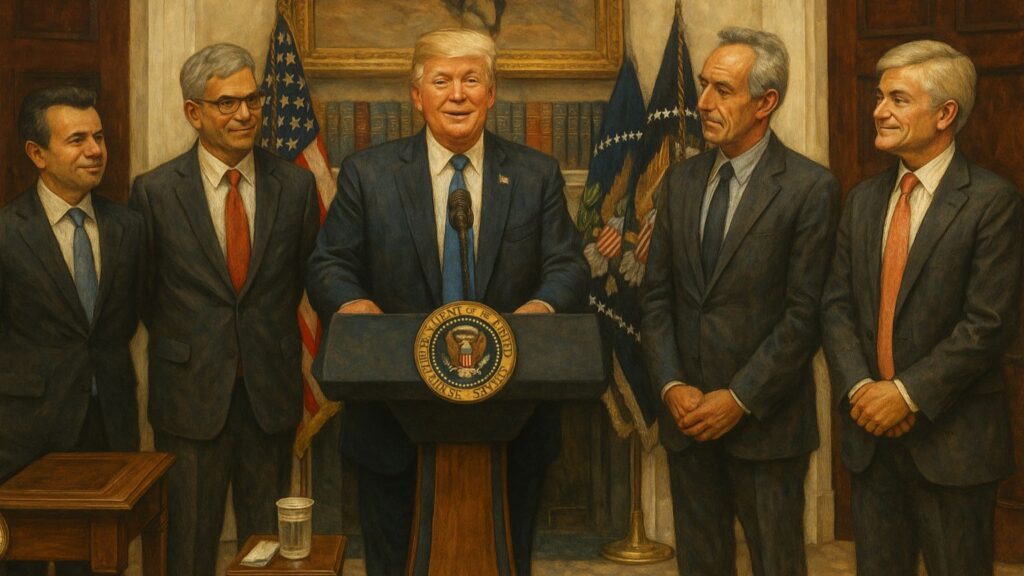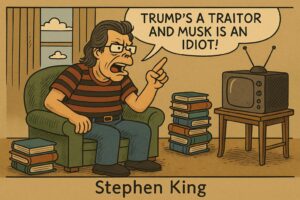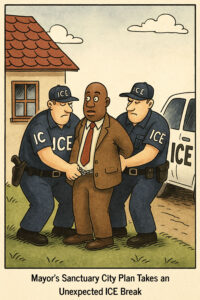 On May 12, with RFK Jr and Dr Oz, Donald Trump held a press conference on his executive order for lowering prescription drug costs.
On May 12, with RFK Jr and Dr Oz, Donald Trump held a press conference on his executive order for lowering prescription drug costs.
The press conference was a masterpiece of political theater, a finely tuned illusion crafted for those willing to believe that sweeping change can be conjured with the stroke of a pen and a round of applause. Donald Trump, Robert F. Kennedy Jr., and Dr. Mehmet Oz shared the stage, each playing their assigned role in this act of orchestrated spectacle: Trump, the boastful magician conjuring miracles from thin air; Kennedy, the opportunistic crusader clinging to populist fervor; and Oz, the celebrity doctor eager to translate pseudo-science into policy. Together, they sold a vision of slashed prescription costs and American dominance over Big Pharma, blissfully ignoring the realities of international trade, pharmaceutical pricing, and legislative impotence. It was vintage Trump: heavy on promises, light on details, and utterly indifferent to the mechanics of real governance.
Donald Trump: The Master of Illusions
Trump’s performance at the press conference was a textbook display of his usual tactics: make grandiose claims, inject personal bravado, and sidestep the deeper issues. His declaration that he single-handedly stopped a nuclear conflict between India and Pakistan by leveraging trade is patently absurd. Trade leverage has been a tool of diplomacy for centuries, and India-Pakistan tensions are rooted in decades of complex geopolitical, religious, and territorial issues. Trump framing this as his solo victory is a complete misrepresentation.
He also praised his own “reset” with China, conveniently ignoring the continued imposition of high tariffs and the economic fallout these have caused for American farmers and manufacturers. The claim that he pressured China to “open up” is misleading at best. The actual negotiations with China have seen them inch forward at a glacial pace, with Trump’s strategy mostly consisting of increasing tariffs and hoping China buckles—a strategy that historically does not pan out as advertised.
Then there’s the healthcare portion. Trump’s boast about cutting drug prices by “60, 70, 80, even 90%” is not just unrealistic—it’s mathematically incoherent. The executive order he signed lacks teeth and fails to establish clear enforcement mechanisms. His promise to equalize prices across nations ignores the reality of global pharmaceutical pricing structures, which are driven by patent law, insurance negotiations, and international treaties.
Bluntly put, Trump’s rhetoric was heavy on self-congratulation and light on actionable policy. He remains consistent in his strategy of declaring victory before the battle even begins.
Robert F. Kennedy Jr.: The Opportunistic Crusader
Kennedy’s presence at the press conference was odd but revealing. His unwavering praise for Trump’s supposed “courage” against Big Pharma reeks of opportunism. RFK Jr. has a history of aligning himself with anti-establishment narratives, but here he’s bending over backward to cast Trump as a populist hero despite the latter’s long history of corporate alliances.
Kennedy’s point that U.S. drug prices subsidize the rest of the world is not entirely wrong, but his framing is disingenuous. European countries negotiate directly with pharmaceutical companies through government health services—something Kennedy conveniently leaves out. The U.S. does not subsidize European drug prices; rather, American drug companies charge more here because they can get away with it.
Kennedy’s alignment with Trump here smells of a calculated political pivot rather than genuine ideological alignment. His narrative about Trump standing up to oligarchs is laughable when Trump himself has long been cozy with billionaire donors and corporate interests. Kennedy is banking on his name and the illusion of fighting for the little guy while conveniently ignoring the broader realities of how drug pricing works.
Dr. Mehmet Oz: The Celebrity Advocate
Dr. Oz framed the executive order as a monumental victory for American patients, calling it the most significant healthcare reform in history. That’s not just hyperbole; it’s downright misleading. The order lacks the necessary legislative backing and international cooperation to enforce these so-called savings. Oz’s NATO analogy—comparing equalized drug pricing to military cost-sharing—is misguided. Healthcare is not a collective defense pact; it’s a market-driven, profit-maximized industry.
Oz also failed to address the elephant in the room: middlemen. Pharmacy benefit managers (PBMs) and insurers are significant drivers of high drug costs in the U.S. The executive order barely scratches the surface of this issue. By focusing on the optics of heroic leadership rather than the logistical reality, Oz is playing politics rather than providing substance.
His portrayal of pharmaceutical companies as victims of European price-gouging is naive. U.S. companies have actively participated in setting these global pricing structures to maximize profit. Oz is either dangerously uninformed or intentionally misrepresenting the situation to flatter Trump and shore up his political ambitions.
Final Thoughts
The press conference was less about policy and more about optics. Trump, Kennedy, and Oz each played their roles—Trump as the triumphant leader, Kennedy as the voice of populist validation, and Oz as the medical expert lending credibility. The problem is that the narrative doesn’t align with reality. The executive order lacks substance, enforcement, and practical application. The trio’s performance was little more than political theater—Trump’s favorite genre.

